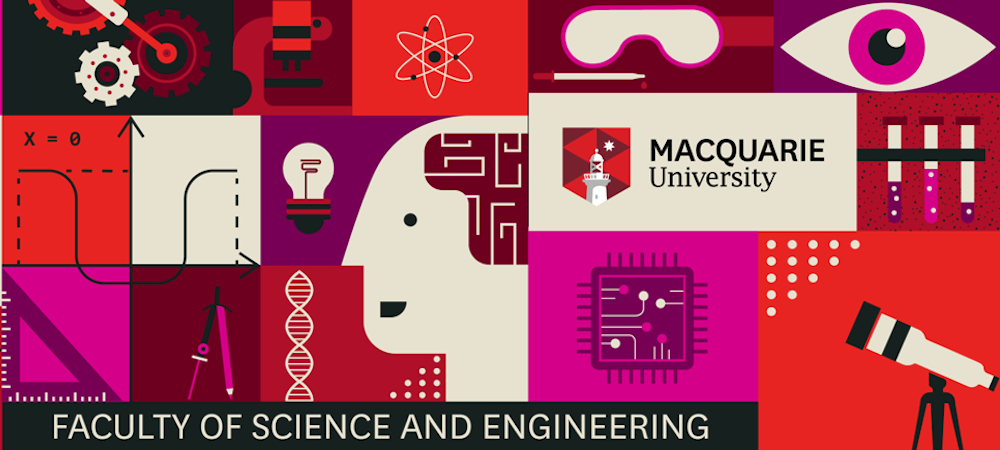During 2023, Macquarie University’s Faculty of Science and Engineering has embraced the goal, to ‘Discover, Create and Innovate,’ with some remarkable results.
As a Faculty, our global rankings are impressive. Macquarie University ranks first in the world in the Times Higher Education Impact Ratings in ‘Life Below Water’ – UN SDG 14 – and fourth in the world for ‘Clean Water and Sanitation’ – UN SDG 6, and rates extremely well across a range of other measures, often ahead of the world’s top 200 institutions.
 Image by Claudia Rosales, Learning Designer, FSE
Image by Claudia Rosales, Learning Designer, FSE
Some of the Faculty’s highlights across education, outreach and research during 2023 include:
Education
The support structures put in place for our students helped us achieve the highest student success rate in three years, at 88.4 per cent in Semester One. We’ve introduced our Marine Science major and implemented time-saving new technology including a sessional staff hiring app, course iLearn pages, and FSE studio. As a foundation partner of IAT-Digital at Meadowbank, we partnered with TAFE and the NSW Government to provide flexible pathways for students to gain high-demand digital skills in cybersecurity, big data, artificial intelligence and cloud computing. And our well-attended end-of-year Student Ball was a fun and engaging event giving our students a well-rounded university experience.
Outreach and Engagement
More than 30 events both on- and off-campus, were managed by our Outreach team, who reached an estimated 16,000 people. Astronomy Open Night sold out this year, with 2,500 people attending an extraordinary one-day experience, and the Faculty also saw our best-ever international student recruitment, with 1,577 international students commencing. FIRST Lego League hubs have also been established in rural and remote areas, reaching over 170 students.
Computing
Our computer science degrees continue to climb in the Times Higher Education World University Rankings, jumping more than 150 places since 2019, and the new ‘MQ Women in Computing Society’ has helped to improve student engagement in this traditionally male field.
Engineering introduced new Master of Engineering (Professional) courses this year, enhancing our broad offering. The Engineering Research Expo showcased the School’s research to over 300 delegates, and the Engineering in a Day event was attended by high school students from across the Sydney basin. The Faculty’s new Engineering Precinct has progressed on schedule this year.
Mathematical and Physical Sciences hosted the inaugural Women in Science Technology Engineering, Maths, Manufacturing and Design Innovation Challenge, and the [EX]plore Conference for Year 12 Science Extension students, which attracted 23 high-schools, promoting the Faculty's commitment to inspiring the next generation of scientists and engineers.
Natural Sciences’ Living Seawalls team won this year’s NSW Coastal Management Award for Innovation, released two new products and installed their 2,500th habitat enhancement panel this year. Macquarie University was named The Australian’s leading institution for Animal Behaviour and Ethology.
Applied BioSciences was recognised in the Vice Chancellor’s Awards for Excellence in Research Innovation, Partnership and Entrepreneurship, for significant research including innovative pest management strategies in the agricultural sector such as combating the invasive Fall Armyworm.
Australian Astronomical Optics, selected for a major international tender to design and build optics for one of the world’s largest ground-based telescopes, also played an important role in the European Southern Observatory through the Pipelines Project Team, and is growing its contributions to the space industry.
MAFF has expanded its capabilities, with both a new field-emission electron microscope and all-in-one digital microscope, as well as a multi-purpose powder diffractometer, ICP-MS trace elemental analyser and production of bespoke research equipment, all supporting significant research within the Faculty such as repurposing of recovered organic materials.
Faculty Research has achieved a remarkable 66 per cent success rate in ARC Linkage grants and welcomed three new Future Fellows.
Our Research Centres, both national and Macquarie-based, include two Macquarie-led Australian Research Council Centres: ARC Centre of Excellence for Synthetic Biology (led by Macquarie) and the ARC Training Centre for Facilitated Advancement of Australia’s Bioactives (jointly accounting for around $51 million in Higher Education RDC income each year). FSE is part of four significant research consilience centres: Data X, Future Communications, Smart Green Cities and Astrophysics and Space Technologies. Macquarie University also serves as a node for the ARC Centre of Excellence for Engineered Quantum Systems and the ARC Centre of Excellence for All Sky Astrophysics in 3 Dimensions.
None of these achievements are possible without the dedication and commitment of our talented professional staff, who have tirelessly delivered top results to support our research, education and industry partnerships throughout the year.